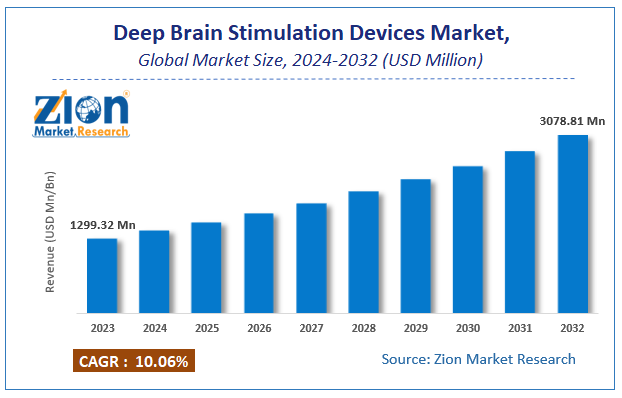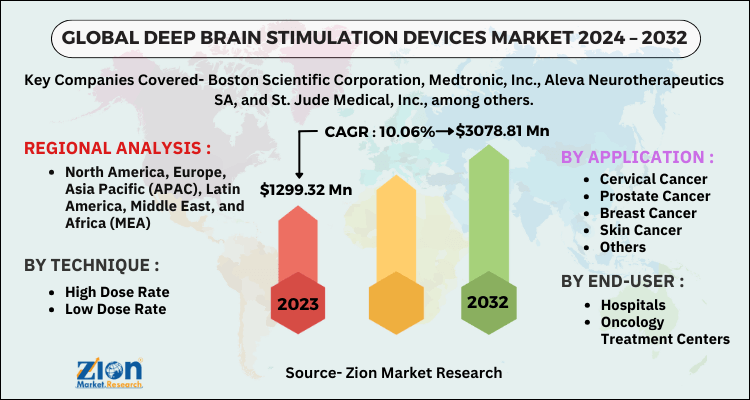Deep Brain Stimulation Devices Market Size, Share, Growth 2032

Deep Brain Stimulation Devices Market By Product (Single Channel Deep Brain Stimulator and Dual Channel Deep Brain Stimulator), By Application (Chronic Pain, Dystonia, Essential Tremor, Depression, Obsessive Compulsive Disorder, Epilepsy, Parkinson’s Disease, and Others), By Battery Type (Rechargeable and Non-Rechargeable), and By Region: Global Industry Perspective, Comprehensive Analysis, and Forecast, 2024-2032-
| Market Size in 2023 | Market Forecast in 2032 | CAGR (in %) | Base Year |
|---|---|---|---|
| USD 1299.32 Million | USD 3078.81 Million | 10.06% | 2023 |
Deep Brain Stimulation Devices Industry Prospective:
The global Deep Brain Stimulation Devices market size accrued earnings worth approximately USD 1299.32 Million in 2023 and is predicted to gain revenue of about USD 3078.81 Million by 2032, is set to record a CAGR of nearly 10.06% over the period from 2024 to 2032.
The study includes drivers and restraints of the deep brain stimulation devices market along with the impact they have on the demand over the forecast period. Additionally, the report includes the study of opportunities available in the deep brain stimulation devices market on a global level.
Deep Brain Stimulation Devices Market: Overview
The increasing burden of disease and mortality has created medical urgency that has induced the urgency to incorporate long-term solutions, such as deep brain stimulators. These stimulators play a vital role in providing therapeutic solutions for various ailments, such as depression, epilepsy, etc. Furthermore, the technological advancements observed in deep brain stimulation devices have further shaped the deep brain stimulation devices market globally. The advancements include enhanced microelectrode designs, multi-target stimulation, robot-assisted implantation, integrated implantable pulse generators, MRI, and individualized directed programming. The advancements witnessed related to deep brain stimulation devices have enhanced the efficacy and reduced the adverse effects along with providing symptomatic relief to patients with movement disorders as compared to other conventional methods.
The prevalence of obesity-induced depression, anxiety, and stress globally is constantly rising. As per the National Institute of Mental Health (NIHM), in 2012, around 15 to 16 million adults in the U.S. went through major depressive episodes. Additionally, as per the WHO, more than 300 million adults globally suffer from depression.
Furthermore, the growing cases of Parkinson’s disease along with the ambiguity of economic conditions faced by some developed economies, such as the U.S. and Europe, has forced the original equipment manufacturers to develop cost-effective devices for treating Parkinson’s disease. Additionally, the preference given by professionals to deep brain stimulation devices over drug therapies is likely to further boost the global deep brain stimulation devices market in the future. However, the risk of infection and high costs associated with the use of these devices might hinder the deep brain stimulation devices market on a global scale.
In order to give the users of this report a comprehensive view of the deep brain stimulation devices market, we have included a competitive landscape and an analysis of Porter’s Five Forces model for the market. The study encompasses a market attractiveness analysis, wherein all the segments are benchmarked based on their market size, growth rate, and general attractiveness.
The report provides company market share analysis to give a broader overview of the key players in the market. In addition, the report also covers key strategic developments of the market including acquisitions & mergers, new product launches, agreements, partnerships, collaborations & joint ventures, research & development, and regional expansion of major participants involved in the market on a global and regional basis.
Deep Brain Stimulation Devices Market: Segmentation
The global deep brain stimulation devices market is segmented on the basis of product, application, and battery type.
By product type, the deep brain stimulation devices market is bifurcated into single channel and dual channel deep brain stimulators.
The application segment of this market includes chronic pain, dystonia, essential tremor, depression, obsessive-compulsive disorder, epilepsy, Parkinson’s disease, and others (Alzheimer’s, tinnitus, etc.).
By battery type, the global market includes rechargeable and non-rechargeable batteries.
Deep Brain Stimulation Devices Market: Report Scope
| Report Attributes | Report Details |
|---|---|
| Report Name | Deep Brain Stimulation Devices Market |
| Market Size in 2023 | USD 1299.32 Million |
| Market Forecast in 2032 | USD 3078.81 Million |
| Growth Rate | CAGR of 10.06% |
| Number of Pages | 201 |
| Key Companies Covered | Boston Scientific Corporation, Medtronic, Inc., Aleva Neurotherapeutics SA, and St. Jude Medical, Inc., among others |
| Segments Covered | By product, By application, By battery type and By Region |
| Regions Covered | North America, Europe, Asia Pacific (APAC), Latin America, Middle East, and Africa (MEA) |
| Base Year | 2023 |
| Historical Year | 2018 to 2022 |
| Forecast Year | 2024 - 2032 |
| Customization Scope | Avail customized purchase options to meet your exact research needs. Request For Customization |
Deep Brain Stimulation Devices Market: Regional Insights
By region, North America dominated the global deep brain stimulation devices market in 2018, owing to the high-quality standards maintained by the medical device manufacturers, increasing cases of Parkinson’s disease, high demand for advanced devices, increasing geriatric population, and rising disposable income of the regional population. Europe is the second largest deep brain stimulation devices market globally, due to the increasing investments made by key players for R&D and continuous innovation in medical technology. The Asia Pacific region is also expected to be a lucrative regional market in the future, owing to the growing prevalence of Alzheimer’s in China. Additionally, Thailand, India, Taiwan, and Singapore have proven to be major medical tourism destinations due to low surgery cost and the presence of highly efficient healthcare professionals.
Deep Brain Stimulation Devices Market: Competitive Space
The global deep brain stimulation devices market profiles key players such as:
- Boston Scientific Corporation
- Medtronic, Inc.
- Aleva Neurotherapeutics SA
- St. Jude Medical, Inc
This report segments the global deep brain stimulation devices market into:
Global Deep Brain Stimulation Devices Market: Product Analysis
- Single Channel Deep Brain Stimulator
- Dual Channel Deep Brain Stimulator
Global Deep Brain Stimulation Devices Market: Application Analysis
- Chronic Pain
- Dystonia
- Essential Tremor
- Depression
- Obsessive Compulsive Disorder
- Epilepsy
- Parkinson’s Disease
- Others (Alzheimer’s, Tinnitus, etc.)
Global Deep Brain Stimulation Devices Market: Battery Type Analysis
- Rechargeable
- Non-Rechargeable
Global Deep Brain Stimulation Devices Market: Regional Analysis
- North America
- The U.S.
- Europe
- UK
- France
- Germany
- Asia Pacific
- China
- Japan
- India
- Latin America
- Brazil
- Middle East and Africa
Table Of Content
Methodology
FrequentlyAsked Questions
Deep brain stimulation (DBS) devices are medical devices that are employed to transmit electrical impulses to specific regions of the brain via implanted electrodes. The modulation of aberrant brain activity is employed to treat neurological and psychiatric conditions.
A growing number of psychiatric disorders, dystonia, essential tremor, epilepsy, and Parkinson's disease are increasing the demand for DBS as a viable treatment regimen.
The global Deep Brain Stimulation Devices market size accrued earnings worth approximately USD 1299.32 Million in 2023 and is predicted to gain revenue of about USD 3078.81 Million by 2032.
The global Deep Brain Stimulation Devices market is set to record a CAGR of nearly 10.06% over the period from 2024 to 2032.
By region, North America dominated the global deep brain stimulation devices market in 2018, owing to the high-quality standards maintained by the medical device manufacturers, increasing cases of Parkinson’s disease, high demand for advanced devices, increasing geriatric population, and rising disposable income of the regional population. Europe is the second largest deep brain stimulation devices market globally, due to the increasing investments made by key players for R&D and continuous innovation in medical technology. The Asia Pacific region is also expected to be a lucrative regional market in the future, owing to the growing prevalence of Alzheimer’s in China. Additionally, Thailand, India, Taiwan, and Singapore have proven to be major medical tourism destinations due to low surgery cost and the presence of highly efficient healthcare professionals.
Some leading players of the global deep brain stimulation devices market include Boston Scientific Corporation, Medtronic, Inc., Aleva Neurotherapeutics SA, and St. Jude Medical, Inc., among others.
RelatedNews
HappyClients
Zion Market Research
Tel: +1 (302) 444-0166
USA/Canada Toll Free No.+1 (855) 465-4651
3rd Floor,
Mrunal Paradise, Opp Maharaja Hotel,
Pimple Gurav, Pune 411061,
Maharashtra, India
Phone No +91 7768 006 007, +91 7768 006 008
US OFFICE NO +1 (302) 444-0166
US/CAN TOLL FREE +1 (855) 465-4651
Email: sales@zionmarketresearch.com
We have secured system to process your transaction.
Our support available to help you 24 hours a day, five days a week.
Monday - Friday: 9AM - 6PM
Saturday - Sunday: Closed







